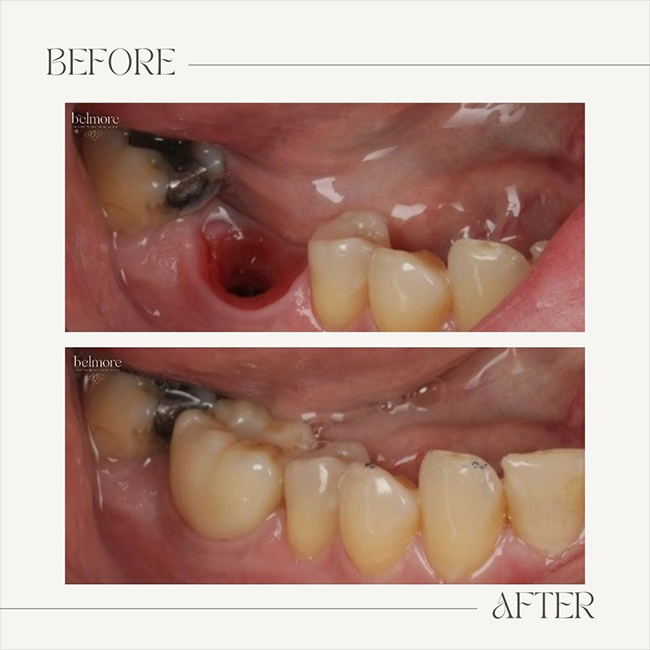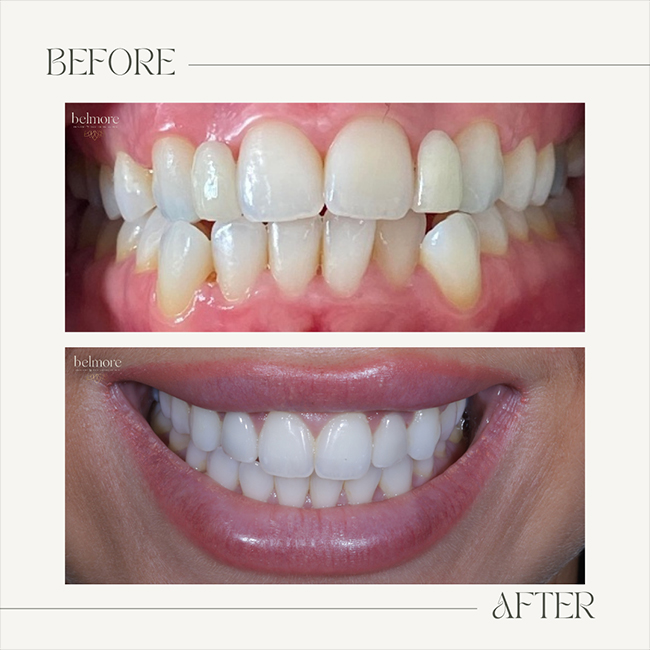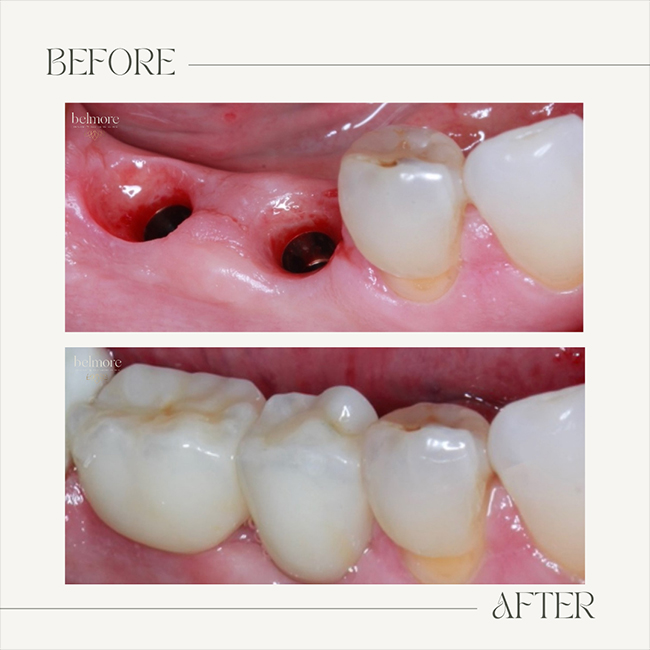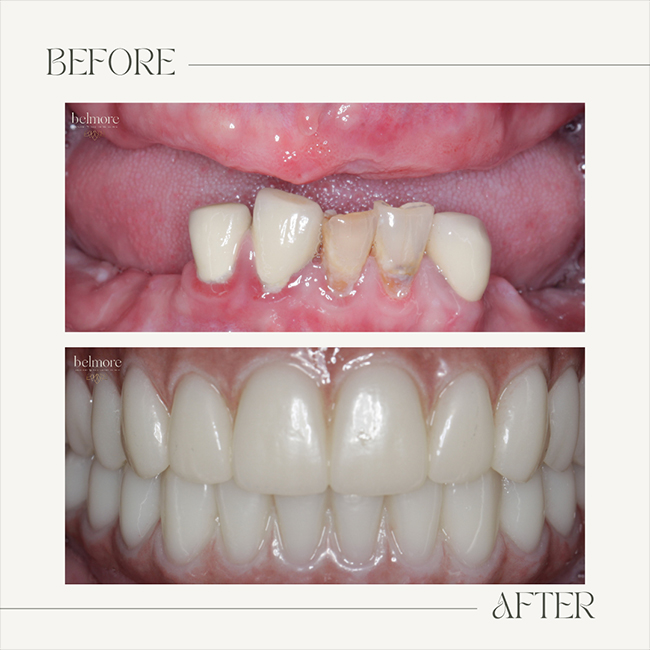
We’ve come a long way from the days when the only option to replace missing teeth was a removable plastic denture. When replacing missing teeth, we have a multitude of different options available to suit all needs and budgets.
People often don’t realise how important it is to replace lost teeth. Missing teeth can affect your speech, how you smile, your confidence, and often cause strain on your remaining teeth. Leaving gaps in the teeth can also encourage the rest of your teeth to move out of alignment, leaving you with a crooked smile.
So, what are my options?
We’ll start with the most budget friendly option – Removable dentures
A denture, often referred to as a ‘plate’ is a removable tooth replacement that can be comprised of either acrylic or chrome. Dentures have some advantages such as being a purse friendly option, they can also provide a nice aesthetic result. However, as dentures are removable and rely on either suction or adhesive to remain in place it can be difficult to get the perfect fit, it can make to biting and chewing on certain foods awkward, and dentures do not stimulate the jawbone, leading to bone loss and facial aging.
Bridges 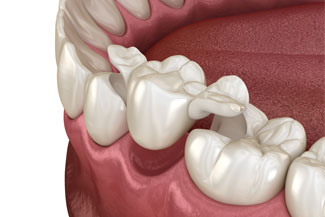
Dental bridges are quite literal in name, they ‘bridge’ the gap created by one, or sometimes more missing teeth.
There are different types of bridges which function in different ways. For example, you have a Maryland bridge, this is a false tooth which is attached to a small wing of metal, these wings are then attached to the back of the adjacent teeth. A conventional bridge differs in that it is secured in place using dental crowns on either side, and finally an implant supported bridge, this would be the best option in terms of a secure, well supported bridge.
Bridges are not a recommended option in every case, often requiring healthy teeth either side which may need to be filed down at times to accommodate the bridge.
Implants 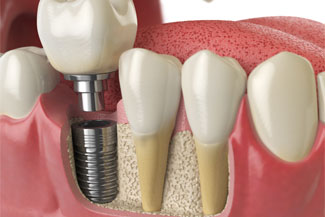
Dental implants are the gold standard for replacing missing teeth due to their likeness to real natural teeth in the way that they look, feel and function. Dental implants also provide the added benefit of helping to preserve the jawbone by stimulating it the same way a natural tooth would, keeping the facial structure intact and preventing premature aging due to bone loss.
Dental implants are small titanium screws which are placed into the jawbone to replace the root of a missing tooth, once this has been allowed to heal and embed into the bone for a number of weeks, a crown or bridge will then be secured on top of this, giving you a fixed long-term restoration.
Some of the questions we get asked most often regarding dental implants include:
- How much do dental implants cost?
At Belmore Dental implants cost £2350 each, where more than one tooth is missing, we can usually place one implant with a bridge to hold a number of teeth, meaning the cost when replacing more than one tooth can often be vastly reduced. We often get asked ‘do you provide payment plans?’ While we don’t exclusively offer payment plans, normally we ask for 60% of the treatment cost on the day that you have your implants placed, with the remainder paid off as and when you like, so long as the balance is clear by your final appointment (usually a number of months start to finish).
We also offer 0% finance options for patients in both the North and South of Ireland if you would like to spread the cost of your treatment. One of our friendly treatment coordinators will be able to walk you through payment and finance options in more detail, and help you should you wish to start an application.
- How long does implant treatment take from start to finish?
This question is one that we get asked all the time, but is so difficult to answer, mainly because every case is unique, there is no one size fits all time frame.
How long your treatment takes will depend on a number of factors, such as, whether you need to have a tooth removed, whether you require a healing period after extraction or whether we are able to place the implant at the same visit, whether you require any bone augmentation, how long your dentist recommends to let the implant embed into the bone and so on.
As a rough guide, implant treatment usually takes around 3-6 months from start to finish.
- Will it be painful?
All dental implant treatments are carried out under local anaesthetic, meaning the area will be numbed via injection prior to the treatment beginning and you will not feel any pain during the procedure. You may feel some pressure during your treatment but no pain.
Any surgery carried out within the mouth has the potential to cause some pain and discomfort in the hours post treatment, however most patients report very little, if any, and is usually very well controlled taking over the counter pain killers.
- How Long will an implant last?
As with your natural teeth, implants will last as long as you look after them. If you practice good dental home hygiene and attend regular appointments with your dental hygienist for professional cleaning services, there is no reason why your implants cannot be a very long-term investment.
Still got questions? Why not book a complimentary consultation with one of our friendly treatment coordinators who will be able to discuss possible treatment options with you in more detail.
To book –
https://belmore-dental.dentr.net/


